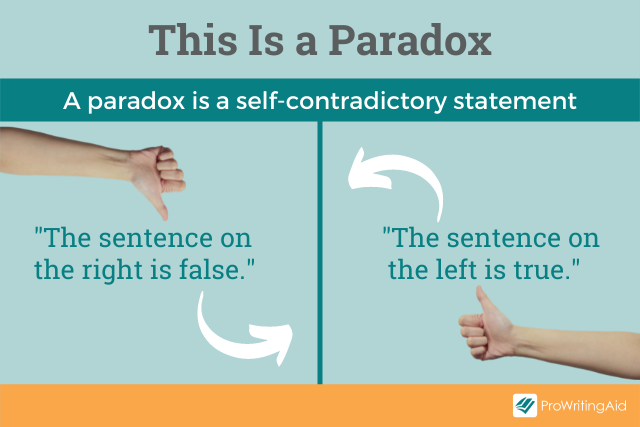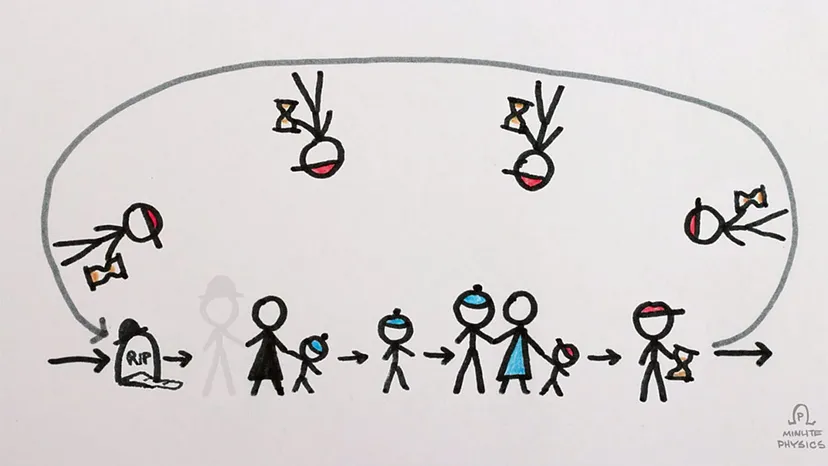
Emmanuel Martinez Portfolio
All About Paradoxes
Published December 31, 2023 10 mins. read
Ever felt like your brain does a flip when you hear something that just doesn't add up? That's the magic of paradoxes – those mind-bending riddles that make you go, "Wait, what?" Paradoxes are like brain teasers on steroids, always keeping us on our mental toes. Picture this: you think you've got something figured out, and then bam! It's the opposite. It's like trying to catch a slippery fish – the more you think you've got it, the more it slips away.
I love paradoxes. I've always been drawn to them because they mess with the rules of the thinking game. They're the ultimate rebels of logic, flipping our ideas upside down and inside out. Join me on this wild ride through paradoxes, where the only rule is there are no rules, and confusion is just the beginning. Get ready for a mental adventure that'll make you question everything you thought you knew.
First things first, let us properly define what a
paradox is just so we're on the same boat. Dictionary.com
defines paradox as
a statement that seems self-contradictory or absurd
but in reality expresses a possible truth
.
To put it plainly, a paradox is an apparent contradiction
that, upon closer inspection, reveals a
deeper and often unexpected layer of truth.

If the right one claims to be true, then it must be telling the truth. But if it's telling the truth, then the sentence on the left is true. It creates a loop – a kind of verbal maze with no clear beginning or end. This is a simple example of a paradox, where the statement leads to a self-referential contradiction.
Paradoxes have been boggling people's brains for ages, making people scratch their heads from ancient times to today. Thinkers, like ancient philosophers and even today's scientists, have been caught in the paradox web. But today, we are not going to talk about simple linguistic paradoxes: let's examine some of the most perplexing paradoxes in the realm of physics and philosophy— my two absolute favorite subjects.
Theseus Paradox
What it challenges: the nature of identity and persistence over time
The Ship of Theseus, also known as Theseus' Paradox, is a captivating thought experiment that has boggled philosophers for centuries. The paradox is named after the mythical Greek hero Theseus, who, according to legend, sailed on a ship that was preserved by the Athenians for centuries. The thought experiment goes like this: Imagine there is a ship, let's call it the Ship of Theseus. Over the years, as the ship sails the seas, its wooden parts start to wear out and decay. To maintain the ship, the Athenians decide to replace the old, decaying planks with new ones. Over time, they replace every single part of the ship until none of the original wooden pieces remain.

The Ship of Theseus was rebuilt over the centuries as wood rotted and broke, so at what point did it stop being the original, and when did it become something else?
Now, here comes the paradox: Is the reconstructed ship still the Ship of Theseus? On one hand, every part of the ship has been replaced, so technically, none of the original components are present. On the other hand, the ship as a whole still maintains its function and purpose as the Ship of Theseus. To add another layer to the puzzle, imagine that the removed wooden parts from the Ship of Theseus are collected and stored. The Athenians decide to use these old parts to construct a new ship, which is now sailing alongside the first one. Now, we have two ships: one that has had all its parts replaced (the Ship of Theseus), and another constructed from its original parts. Which, if any, is the true Ship of Theseus? This paradox raises profound questions about the nature of identity, continuity, and the concept of what makes an object or being the same over time. It also delves into philosophical discussions about personal identity, as similar questions can be asked a bout the persistence of identity in human beings undergoing gradual changes.
Sorites Paradox
What it challenges: the classical understanding of how categories and definitions work
Now let's move on to a somewhat related paradox to the Ship of Theseus. "Sorites" comes from the Greek word for "heap," and the paradox explores the problem of how we define categories with imprecise boundaries. The paradox goes like this: Imagine you have a heap of sand. Let's say it's a thousand grains of sand. Now, if you remove one grain, you still have a heap. No one would argue that one grain of sand makes the difference between a heap and a non-heap. If removing one grain doesn't change a heap into a non-heap, then the same logic should apply to removing another grain. So, you remove one more. The heap remains. You continue this process, removing one grain at a time. At each step, the heap still seems to be a heap. However, at some point, you look at what's left, and it's no longer a heap. The paradox arises when you try to identify the precise moment when the heap becomes a non-heap. There's no clear boundary— no specific number of grains where the transition occurs. It seems that no matter how many grains you remove, you can't pinpoint the exact moment when the heap ceases to be a heap.

How can we define a clear boundary between a "heap" and a "non-heap" when, despite making small, gradual changes like removing one grain at a time, the Sorites Paradox reveals the inherent vagueness in our attempts to precisely categorize such concepts?
The Sorites Paradox challenges our intuition about categories and definitions. It suggests that certain concepts, like "heap" or "bald" or "tall," are inherently vague because there's no clear line of demarcation. The paradox invites us to reflect on the nature of language, classification, and the way we understand gradations and boundaries in our everyday concepts.
The Grandfather Paradox
What it challenges: the consequences of altering the past
Now let's move onto one of the most famous paradox of all-time: the Grandfather Paradox. It is a thought experiment that explores the potential logical contradictions and challenges associated with time travel. It is often used to illustrate the logical contradictions that might emerge in a hypothetical scenario where time travel is possible. The paradox has many variations, but at its core, it goes like this: Imagine a person invents a time machine and decides to travel back in time. Let's call this time traveler 'Juan'. Juan has a particular mission in mind: to kill his grandfather. He then gets to his time machine, go back many decades, prior, and successfully kills his grandfather. But— by killing his grandfather, he inadvertently prevented his own father from being born, and eventually, him. thus, if Juan was never born, then he couldn't have traveled back in time to kill his grandfather in the first place.

If Juan travels back in time to prevent the existence of his own grandfather, and thus his own father, then how could he exist to kill his grandfather in the first place?
This creates a logical loop or paradox. The existence of the time traveler seems to depend on events in the past that they are actively changing, leading to a contradiction. The question then becomes: If the time traveler prevents their own existence, how can they exist to travel back in time and create the situation in the first place? The grandfather paradox is one of the issues that arises when considering the possibility of backward time travel, as it highlights the potential difficulties and logical inconsistencies that may be involved in altering the past. However, several 'solutions' have been proposed to solve this paradox, such as the existence of parallel universes or alternate realities, where the action of the time traveler creates a branching timeline that exists outside the 'main' timeline. There is also the Novikov Self-Consistency Principle, a theoretical concept by a Russian physicist named, well, Novikov, that attempts to reconcile the idea of time travel with the laws of physics within the framework of Einstein's General Theory of Relativity. In a nutshell, it basically suggests that in a possibility of time travel, spacetime itself would be consistent and self-contained. If an event were to occur that could potentially lead to a paradox, the laws of physics would somehow conspire to prevent the occurrence of such paradoxical situations. In our example, if Juan tries to kill his grandfather, the physical law of the universe will always prevent such action to preserve the consistency of the timeline, and thus the fabric of our reality.
However, these solutions remain theoretical, as well as the possibility of backwards time travel. Some physicists and philosophers argue that the presence of paradox in these situations could only one thing: that time travel into the past is indeed an impossibility.
Well, that's kind of a relief, if you ask me.
The Bootstrap Paradox
What it challenges: the idea of causal loops and the origin of information
Similar to the Grandfather Paradox, the Bootstrap Paradox is another paradox related to time. Yes, if you didn't notice up until this point, I love talking about time, well, all the time. So let's explore another paradox that challenges our understanding of how time really works.
The Bootstrap Paradox is a theoretical concept that arises in discussions about time travel and the potential consequences of information or objects existing without a clear origin in time. Hence, it's also known as a causal loop or ontological paradox. The paradox gets its name from the idea of pulling oneself up by one's "bootstraps", an idiom implying a self-sustaining or self-creating process. The paradox has also many variations, but it goes something like this: Imagine a scenario where a time traveler goes back in time and gives Shakespeare a copy of his own complete works, claiming it to be a gift. Shakespeare then publishes these works under his own name. In this scenario, it's unclear where the information (Shakespeare's works) originated. Did Shakespeare create it, or did the time traveler bring it from the future? The information seems to have no clear point of origin; it's in a causal loop where its existence depends on itself. If the time traveler didn't create the works but merely delivered them to Shakespeare, and Shakespeare didn't create them but only published them, there is no clear origin of where it came from.
This creates a paradoxical situation where the information or object exists without a discernible beginning. It seems to be in a loop where its existence depends on events in the future, but those events, in turn, depend on its existence. The Bootstrap Paradox raises questions about causality and challenges our intuitive understanding of cause and effect. It suggests that, in a universe with time travel, information or objects could circulate in closed causal loops without a clear origin, making it difficult to determine how they came into existence. This once again, exposes two possibilities: that maybe we need to re-examine our understanding of time, or maybe reconcile with the idea that our place is not on the past, nor the future, but here in the present.
So, there you have it: my most favorite paradoxes ever. These mind-bending mysteries are like old friends that never fail to stir up a sense of wonder and curiosity in the depths of my thoughts. Each paradox, a riddle in its own right, challenges the way I see the world and keeps me on my toes, always ready for a mental adventure.